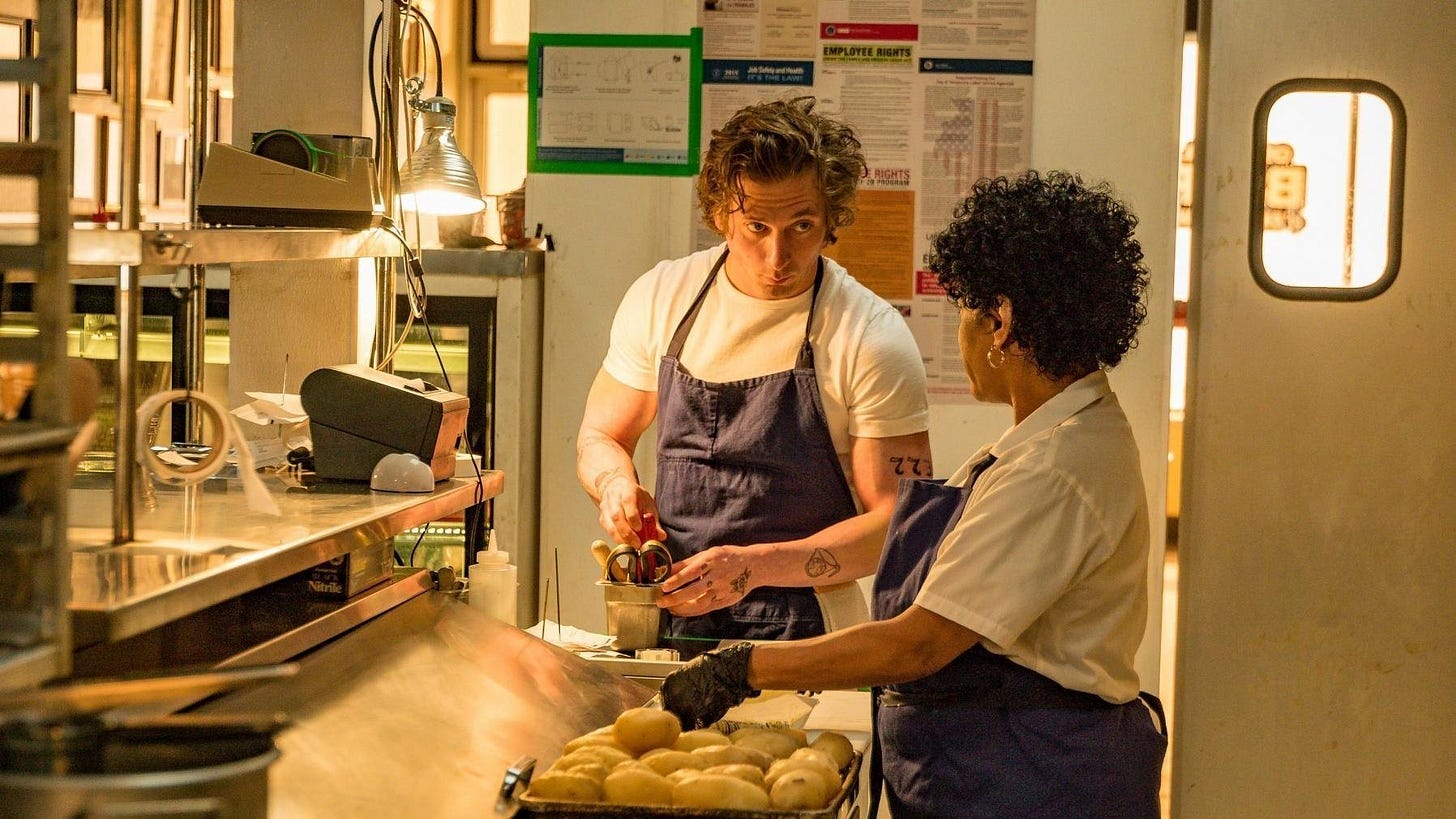How Intimacy, Mayhem Clash on ‘The Bear’
Innovative stories are more than just those from auteur filmmakers–as it has never been more clear that honesty is the best policy; sticking to what you know and love. Tossing in some surprising faces and eliciting wholly captivating performances from t
A young chef, Carmen "Carmy" Berzatto, leaves behind his world of fine dining and Michelin star restaurant and comes home to Chicago to run his family's Italian beef sandwich shop, after the suicide of his older brother. Not only must he grapple with his own pain and family trauma, he is left to deal with his brother's unresolved debts, a rundown kitchen, and an unruly staff.
— Official Synopsis
SPOILERS AHEAD
SPOILERS AHEAD SPOILERS AHEAD
Even as the Emmys were officially canceled and slated for January of 2024 due to the ongoing SAG-AFTRA and WGA strikes, no one can stop talking about a handful of shows. Ted Lasso had an incredible first two seasons—with somewhat mixed reception of the third (and maybe final) season—and Abbot Elementary continues to charm network audiences with wit, hilarity, and narrative dissecting the generational divide in the public education system. The most decorated drama from the television academy, Succession, delivered a somewhat feel-bad ending (maintaining the gold standard for TV entertainment) and retained the show’s DNA. HBO’s Barry, however, which had been heralded as groundbreaking television for its particular mix of intensity and comedic charm, left fans feeling a little chilly after a bleak and bitter end. The latter show blurred the lines between the two major nomination categories: offering a comedy-drama hybrid of sorts.
Succession, Abbot Elementary, and Ted Lasso remained in their respective lanes, while Barry attempted a radical departure. Barry’s themes may have remained consistent from its initial premiere in 2018, but the tone deviated dramatically. Many of the reviews published after the finale criticized the creators for uprooting several of the characters for somewhat of a “shock factor.” For this reason, it is hard to imagine a world in which any of the show’s Emmy nominations lead to a win. Yet, viewers (and voters, I’d argue) are hungrier than ever for innovative storytelling. Whether or not the final episodes of Barry sparked a deeper love for the property, the bold swing from the creators may encourage other showrunners to cut a little deeper and deliver a show unlike anything we’ve seen before. Enter: FX’s The Bear.
Showrunner and creator Christopher Storer serves television audiences with, perhaps, the most accurate depiction of life in a blazing kitchen. Restaurant experts and chefs alike praise the illustration of the characters, the cruelty in serving the public, and the state of the food and beverage post-pandemic. Storer, who grew up in a suburb of Chicago, was adamant to make a show that closely resembled the reality of working at a real restaurant. “It’s all about the details. It has to show how hard it is. Not only from a skill level. But—it’s a hard business…” Storer told Esquire last year. Based off the real Chicago establishment, Mr. Beef, The Bear follows an ensemble cast led by Carmy (Jeremy Allen White). Carmy returns to his hometown following the tragic suicide of his brother, Michael (Jon Bernthal), to salvage the family’s Italian beef shop, which by all accounts is failing. Ayo Edebiri, Lionel Boyce, Ebon Moss Bachrach, Liza Colón-Zayas, and real-life chef Matty Matheson round the cast spectacularly.
The Bear’s ensemble nature favors a heavily family-centric narrative. While not entirely parallel, the crew acts as an extension of the family–something that feels so authentic to restaurant dynamics. If you’ve spent time working in a kitchen, I promise the show will feel meticulously devised. After 18 episodes of riveting television, The Bear’s most poignant moments are those involving the supporting characters. And, I mean, after watching Season 2 it’s questionable to even call some of them supporting characters. Two episodes come to mind, both products of The Bear’s second season: “Honeydew” and “Forks,” episodes four and seven, respectively. In “Honeydew,” Marcus (Lionel Boyce) travels to Denmark to learn the art of pastry from a chef named Luca as The Original Beef prepares renovations for their grand re-open.
We know that Marcus’ mother has been sick for some time and that he has been incessant to stay by her side. The experience of traveling to Denmark to learn from one of Carmy’s colleagues, then, is somewhat a relief for him (even if he might not view it that way). Inadvertently, the audience can deeply exhale in comfort with him as he waters a non-existent cat. Similarly, Syd (Edebiri) sends Tina (Colón-Zayas) and Ebra (Edwin Lee Gibson) to culinary school to sharpen their skills this particular season. Tina, who initially was reluctant to change after Michael, warms to the idea of learning the clinical nature of being a chef and adopting the new structure set forth by Syd and Carmy. Ebra can’t quite crack the process due to some tragic extenuating circumstances, but eventually accepts their attempt to help.
“Forks” might just be my favorite episode of the season (even including “Fishes”). Perhaps, it comes from the gutting performance of Ebon Moss Bachrach as Richie. After all, he was Michael’s best friend and had the most to lose from his passing outside of the Berzatto family. We learn of Richie’s marriage troubles and the “Bad News” he exudes. His reluctance towards change is even more prevalent than Tina or anyone else in the restaurant. A quick explanation could be that he knows better than anyone what The Original Beef signifies for the Berzatto family. His rageful blunder is a direct consequence of his proximity to Michael. Though, it appears that Carmy is breaking through on some level, especially with Nat’s (Abby Elliot) help. “[Richie] is grieving by screaming at Carmy—he is able to scream at Michael through this kid. And it is unpleasant, and he is saying awful shit. But he is also in real pain,” Storer says about the character.
His horrifying intensity in the first few episodes almost made the show unbearable at times. Everyone dialed to 10, truthfully, but especially Richie. Yet, in context feels like the only right way to present the character. Cut to his time staging at Chef Terry’s restaurant (another favor called by Carmy). Richie hesitates to recognize that polishing forks is meaningful to perception. Slowly but surely, he understands what it means to “present.” By learning the meticulous nature of polishing forks and the time management of running expo, he is able to comprehend the meaning of Every Second Counts. Richie was always an anchor for The Original Beef because he knows the area and the people in this neighborhood. By seeing how Chef Terry executes an impeccable dining service–giving patrons an unforgettable, and deeply personal, experience–he sees the bigger picture.
And on the topic of how fundamental the ensemble is to the quality of The Bear, Season 2, Episode 6: “Fishes,” dishes-out one of the best episodes in modern television–illuminating the aureate palette of show’s core, familial principles. Laced with anxiety and a swift jab of adrenaline, “Fishes” reminds us of the madness in the first episode of the series in that life in the Berzatto family will never be dull; the staunch parallel of chronic fatigue amplified only by the sound of multiple ticking timers and roaring exchanges. This dissolution originates from the dinner table and is what ultimately binds the characters together. Yet, Storer’s ability to reduce the heat in more intimate moments between Michael and Carmy, or Cicero (Oliver Platt) and Richie’s then wife Tiff (Gillian Jacobs), for instance, set the stage beautifully for clever call-backs and affecting beats.
At the flashback dinner, Tiff, whose pregnancy is inflicting intense nausea reflexively, can only handle eating light foods and mentions a banana as an example of what she would be able to eat. Cicero reveals to Tiff that his father used to take him to a local stand to get the best chocolate-covered bananas. Apparently, he had passed the stand on the way to Christmas dinner and the memories flooded back. Flashforward to The Bear’s opening friends and family night, Richie rips a page out of Chef Terry’s book to bring Cicero a bite from his past. It’s a sweet moment, quite literally, and reinforces how air-tight the writing of FX’s show truly is. The chocolate-covered banana is analogous to a similar beat from the first season, where Carmy in the earlier episodes questioned why Michael wasn’t ordering #10 tomato cans (again with authenticity of working in the restaurant industry–why get anything but #10 cans?). Turns out, via an intimate letter from Michael to Carmy, “they taste better.”
We didn’t know then that Michael had actually saved the entirety of the $300,000 loan from Cicero to bankroll Carmy’s vision for their restaurant. Through all the yelling and sour comments to one another, the family remains committed to each other’s success. Carmy screams, “Fuck you,” at Richie, to which he responds, “I love you, man.” The dichotomic relationship of the ensemble encourages growth and compassion among them through sharp writing. Storer’s honesty on the page translates to a more tangible setting–one that allows for the fusion of drama and comedy for a more satisfying viewer experience. I am reminded of the feeling I got at the beginning of Better Call Saul. The basis of visual storytelling couldn’t be more dissimilar, but the dance between intimacy and mayhem are just as compelling.
This is all to say: don’t sleep on this show any longer than you have to. Subsequently, don’t underestimate the chances it has to nab some Emmys come January of next year. Innovative stories are more than just those from auteur filmmakers–as it has never been more clear that honesty is the best policy; sticking to what you know and love. Tossing in some surprising faces and eliciting wholly captivating performances from that same talent won’t hurt either. The Bear rejects the unmoving pessimism of aforementioned shows like Succession and Barry by finely plating a more human depiction of the 21st century family, albeit in a toxic stew of love and abhorrence. The reduction of the ingredients–together–are noticeably more flavorful.







